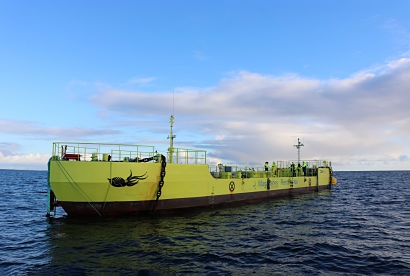
The new air filters for cells with an output of 25–50 kW or 80–120 kW reliably protect fuel cells from harmful gases and particles, ensuring the operation of the fuel cell over the entire service life of a vehicle and minimizing the use of expensive catalysts.
RETL designation is awarded by the International Electrotechnical Commission – Renewable Energy System (IECRE) which operates a global certification system addressing three renewable energy sectors: solar photovoltaic (PV), wind energy, and marine energy.
Currently, a prerequisite to being recognised as a RETL in the marine energy sector is to be accredited as a test laboratory; EMEC has been accredited by the United Kingdom Accreditation Service (UKAS) to ISO/IEC 17025 as a test laboratory since 2005 and ISO/IEC 17020 as an inspection body since 2014.
Up until now, EMEC could perform accredited performance assessments within the UK; RETL designation enables EMEC to perform tests to assess the power performance of tidal energy converters anywhere in the world in compliance with IEC TC 114 Technical Specifications (precursors to international standards).
For now, the RETL designation only covers the power performance assessment of tidal energy converters (IEC/TS 62600-200), however, the IECRE System is in the process of expanding such a designation to cover wave energy converters and additional competence areas as well.
“Given the complexity and size of the challenges in developing ocean energy technologies - consenting, commissioning, installation, operations, maintenance - it is extremely difficult for investors, funders and insurers to adequately conduct comprehensive technical due diligence” said EMEC’s Technical Manager, Elaine Buck, explaining why attaining RETL designation is a vital milestone for the ocean energy sector. “Thus, the IECRE offers a comprehensive and transparent third-party renewable energy conformity assessment system that ensures that project installations adhere to accepted international standards. For EMEC, gaining RETL designation is a major achievement, providing independent assurance that ISO/IEC 17025 and IECRE criteria have been met for integrity, technical competence and quality, and that the methods we use are standardised and transparent. RETL status opens up international markets to EMEC for testing ocean energy devices, subsystems and components on a worldwide basis. While there are 29 RETLs for wind energy globally, EMEC is the first RETL for ocean energy technologies in the world.”
The first technology to be assessed by EMEC as a RETL will be Verdant Power who are working to receive the first internationally recognised Renewable Energy Test Report (RETR) through the IECRE system. Verdant are gearing up to deploy three Gen5 turbines in New York City’s East River later in 2020. EMEC have been supporting them in preparing for the power performance assessment.
“EMEC has been instrumental in the development of Technical Specifications on IEC TC 114 and, as a founding member of the IECRE, participating across the IEC standards and conformity assessment activities” added Jonathan Colby, ME-SWG Convenor and IEC TC 114 Chair. “The IECRE aims to facilitate international trade in marine, solar PV and wind energy by verifying the safety, performance and reliability of equipment and services. The processes are created by the sector, for the sector, with EMEC contributing to various technical working groups focused on wave and tidal power performance, technology qualification, electrical power quality, certification scheme rules and finances, among others, as well as chairing PEL/114 coordinating UK input into the IEC Technical Committee 114 (Marine Energy). Gaining this RETL designation demonstrates EMEC’s technical competence, ensuring that procedures, data analyses and reporting are aligned to international best practice, processes are in place ensure impartiality and test reports that will be globally accepted, enhancing access to markets and financing for tidal energy developers.”
For additional information:

